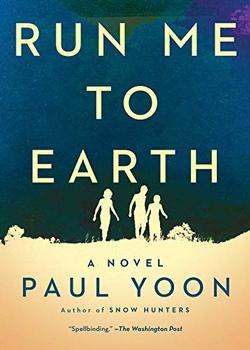Summary | Excerpt | Reading Guide | Reviews | Beyond the Book | Readalikes | Genres & Themes | Author Bio

In her sleep, Noi slid across, thinking Alisak's lap was a pillow. She was dreaming; he could sense the shudder of it as if she were leaping. She twisted up slightly, and he stared at the rise of her hip, that angular bone, began to reach for it but changed his mind, suddenly self-conscious of the fact that he hadn't bathed in a week. He looked away. Her hand fluttered. And then he reached down and turned the old ring around her thumb that she had found somewhere and never took off because she often did this herself, when she was troubled or when her mind was far.
And as her body calmed and she rolled back to her pillow, he also wondered, as he often did, if anything had happened to her at the party. And if something did, what that was. He tried to remember the car and that man inside, calling them over. And that he himself had stood there doing nothing, staring at the man's money and then, a moment later, staring at her leaving in the car.
Twelve.
If that man were here, Alisak would kill him. These days he could. For that matter, Noi could, too. They could use a syringe full of air or a scalpel to find a quick vein. They could lead this Tobacco Captain across one of his own fields that were now covered in unexploded bombs, stand back, and watch to see which of his limbs blew out first as though lightning had struck a tree.
They had been told of or had seen things like that. They had grown stronger, running about through the ruin of this house, lifting heavy boxes and empty shell casings. And, to their surprise, they had also become healthier, with food that wasn't much but was much more than what they were used to.
They drove the motorbikes. Noi was a better rider than him but always let him lead, pretending she wasn't. Some sense of courtesy or humor alive even in all this.
There was a painting upstairs that Alisak thought looked like her. A girl by a river. A basket of fish hanging from the crook of her arm. He had never seen Noi with a basket of fish and probably never would, but it looked like her: the dark hair, the posture that held a sense of both shyness and confidence. He had considered taking it down and hiding it, to keep it for himself.
Supposedly, the paintings that remained on the walls were famous and stolen. Alisak caught an aid worker one night taking one out of its frame and rolling it up. His eyes never left Alisak. Then he walked past, whistling, and tapped Alisak's head with the canvas like he was a drum.
What painting had that aid worker taken? He tried to recall this, seeing a hill in his mind.
They were around the same age, Alisak, Prany, and Noi, and they had once lived next door to each other on a different hill, in a small settlement on the outskirts of the town, where the space between their houses was the width of a motorbike's handlebars. Where they were aware of the sound of each other behind the perpetually damp walls—the sound of their bodies, the clatter of their makeshift kitchens in the corner, their voices calling to play, calling for help—aware of each other's shadows outside their wooden doors long before they had a sense of a greater world beyond that slope, that river.
Then they had cared for each other when there was no one else to care for them. Alisak's parents eventually succumbed to the opium they were lured to farm; the siblings, who had no memory of their mother, lost their father early on in the war, when he was hired by the government to fix a bombed road two days' journey south but was caught by the Pathet Lao. He was told to walk the road as the soldiers took bets on whether he would step on a bomb, grew bored when nothing happened, and shot him. Neither Prany nor Noi was certain of anything for weeks—their father was often gone—until the peddler who passed through every season came to the hill, asking for them.
It was when the fighting intensified, after that encounter with the Tobacco Captain, that they began to wander the country, always staying together, sleeping where they could, finding work where they could, avoiding the armies where they could. They spent three years surviving the rainy seasons, the sudden approach of strangers, and a war where the boundaries shifted endlessly, where they often jolted awake from the sound of bombers or the sudden appearance of an army in a town or a village they were staying in.
Excerpted from Run Me to Earth by Paul Yoon. Copyright © 2020 by Paul Yoon. Excerpted by permission of Simon & Schuster. All rights reserved. No part of this excerpt may be reproduced or reprinted without permission in writing from the publisher.
Your guide toexceptional books
BookBrowse seeks out and recommends the best in contemporary fiction and nonfiction—books that not only engage and entertain but also deepen our understanding of ourselves and the world around us.